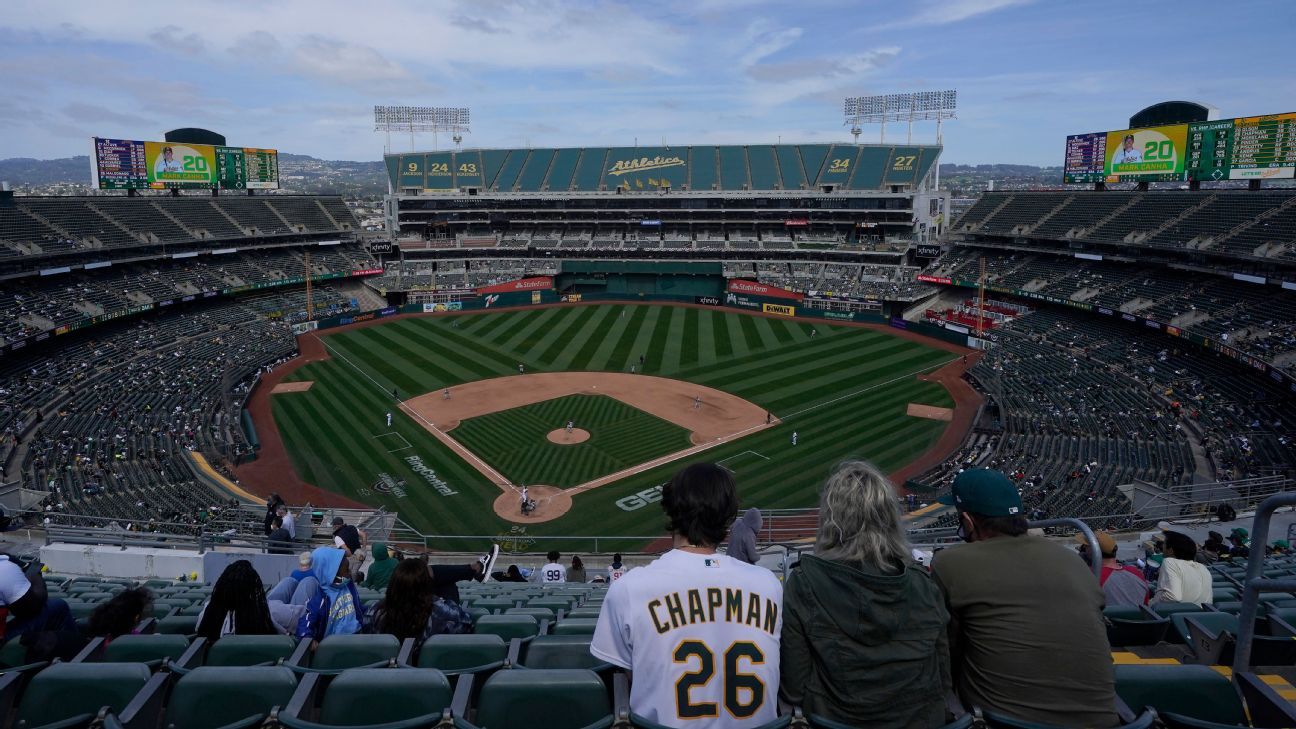Eight Oakland City Council members will cast non-binding votes for a proposed $12 billion development and ballpark plan on Tuesday morning. An affirmative vote will simply keep the ambitious project alive, but a dissenting vote, the Oakland Athletics say, will kick-start the team’s relocation efforts.
Speaking roughly 22 hours before that crucial vote, A’s president Dave Kaval still didn’t know what to expect.
“Our future in Oakland is hanging in the balance,” Kaval said in an interview with ESPN on Monday afternoon, “and we are doing everything we can to get a ‘yes’ vote tomorrow on our plan and keep the A’s rooted in Oakland. But we don’t know if we’re gonna get a positive vote. There’s still a lot of areas we’re apart significantly with the city, and we go into the vote not knowing how it’s gonna play out.”
A two-decade-long process to secure a new stadium in the Bay Area has reached what Major League Baseball commissioner Rob Manfred referred to as “the end” prior to last week’s All-Star Game. There have been unsuccessful proposals in San Jose, Fremont and multiple sites in Oakland, most notably around Laney College. Renovations of the current Coliseum site, where the A’s have played since 1968, have been deemed nonviable largely because of the team’s stated desire for a downtown location.
All that is seemingly left to prevent the A’s from leaving Oakland — and following the recent paths of the NBA’s Golden State Warriors and the NFL’s Las Vegas Raiders — is a 35,000-seat waterfront ballpark proposal within the Howard Terminal site in the Port of Oakland.
The A’s made public proposals in April stating that they would privately finance the ballpark, which will cost an estimated $1 billion, while also providing $450 million in community benefits and arranging for an additional $11 billion in private investment to eventually build up the surrounding neighborhood. But the City of Oakland made a counter-proposal on Friday that Kaval said “lacks details and specifics and really doesn’t answer any of the questions that we have that need to be addressed to continue to move forward.”
The biggest issue stems from the $855 million the A’s have asked the city to pay in infrastructure improvements using taxes generated by the project. The A’s proposed two infrastructure financing districts to cover that cost, but the city rejected the proposal to create an additional district at nearby Jack London Square, leaving what Kaval estimated as a $352 million shortage that the A’s would have to cover.
“That’s an extraordinary sum of money,” said Kaval, who has been leading the A’s stadium efforts since joining the team in November of 2016. “And not having specificity is a key concern. There’s also concern about additional taxes that they’re putting on the project — condo transfer tax, a transportation tax that obviously push up the cost as well. Those are all items that are problematic. And we’ve been clear that the project can only do so much. We can’t solve all of Oakland’s problems, but we can do a lot to make this a better community and keep the A’s here for many generations to come. And that’s why we’re looking for an affirmative vote on our plan.”
The A’s need at least five council members to approve their plan, or four council members plus Oakland Mayor Libby Schaaf. Kaval said there has been “continuing negotiations” over the weekend and into Monday but that the two sides “remain significantly apart.”
The Mayor’s Office declined to comment when reached by ESPN on Monday. Justin Berton, a spokesperson for Mayor Schaaf, released a statement saying: “The City and the A’s are continuing their dialogue today with the shared goal to make a world-class ballpark a reality. The City will continue to advocate for a proposal that supports and serves Oakland and our entire region, provides affordable housing, public parks, great jobs and other direct benefits for the community — all without risk to our Port, our taxpayers, or the City or County’s general funds.”
The A’s lease at what is now called RingCentral Coliseum expires after the 2024 season. If ultimately approved, the Howard Terminal ballpark wouldn’t be ready until 2027, leaving the A’s with a two-year gap to cover in Oakland.
In the meantime, team officials have continued exploring Las Vegas and its surrounding areas as an alternative. Kaval and A’s owner John Fisher have made three trips to South Nevada this year and plan to return there on Wednesday. Manfred said last week that it would be “a mistake” to refer to the Vegas option as a bluff, calling it “a viable alternative for a major league club.” A “no” vote on Tuesday — City Council members will meet at 9 a.m. PT — could trigger conversations with other potential relocation sites such as Portland, Nashville, Vancouver and Montreal, among others.
Kaval isn’t clear on whether the city would ultimately vote on the A’s plan, which was presented to Oakland officials at the start of 2021, or the city’s counter offer from Friday, adding that a “yes” vote on the latter would be “akin to a ‘no’ vote” because the team does not approve.
“In many ways we’re down to our last at-bat in Oakland,” Kaval said. “But if we get a win tomorrow, and an agreement we agree with, we can send it into extra innings and hopefully get the final victory in the fall.”
